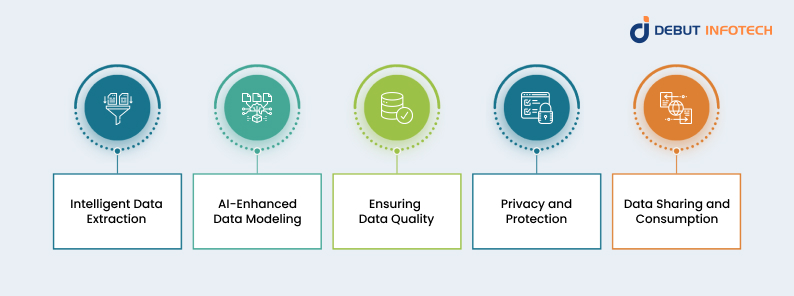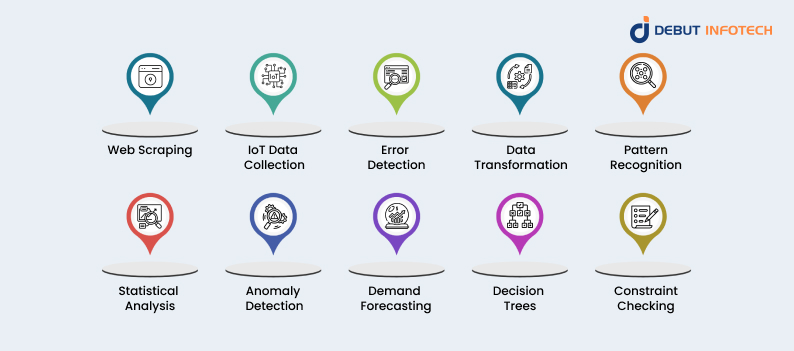Table of Contents
Home / Blog / Artificial Intelligence
Transforming Data with ML Master Data Management
April 15, 2025

April 15, 2025
As businesses are becoming increasingly data-oriented and cloud-focused, they experience the simultaneous need to handle substantial data volumes and expanding data complexities. With the rapid influx of data from IoT devices, mobile applications, and interconnected technologies, there’s a need for more storage capabilities.
But here’s the real question: how well is your organization turning this data chaos into competitive advantage?
Transitioning to cloud infrastructure stands as a business necessity rather than a technological fad. Companies need to advance past just buying digital tools toward extracting maximum value from their valuable data resources.
Organizations must demonstrate Data Agility which represents their ability to rapidly adjust their operations according to evolving needs within global data networks. Why does it matter? Because poor-quality data isn’t just a nuisance—it’s costly. In fact, bad data is estimated to cost organizations an average of $12.9 million annually, according to Gartner.
In recent times, companies have been solving this issue through master data management systems which provide unified truth-based information across organizations. Organizations today require a robust MDM approach powered by ML in master data management, which serves as a necessity for both big data analytics, regulatory adherence as well as long-term data scalability needs. It helps organizations attain unified data while extracting deep insights and discovering hidden data sources which enhance their ability to make smarter and speedier decisions. This synergy between Machine Learning in Business Intelligence and MDM ensures organizations stay ahead of data-driven challenges.
In this blog, we’ll examine how artificial intelligence transforms Master Data Management (MDM) to help enterprises solve data issues and construct a smarter efficient system.
Let’s delve in!
What Exactly Is Master Data?
An organization’s master data serves as the fundamental life-giving information which enables operational processes at both details and strategic levels. Think of it as the “who,” “what,” and “where” behind your business activities: your customers, products, employees, suppliers, and locations. These records constitute the core components which direct and guide transactions, even if the records themselves do not directly perform transactions.
Each of these key domains can be further divided into sub-domains to achieve better categorization and targeted segmentation. Why does that matter? Well, the quality of your master data organization determines how much strategic value you gain because it facilitates operational efficiency and enhances both insights and organizational decisions.
Though, the management of master data transcends simplistic list management principles. Master data management demands a comprehensive methodology which recognizes data as an essential valuable resource rather than merely recorded information.
How is Master Data Different from Other Types of Data?
To fully appreciate the role of master data, it’s important to understand how it stands apart from other common data types:
- Unstructured Data: These include your emails, PDFs, promotional content. Are they valuable? Yes! Tools like NLP in Business can extract insights from this free-form data, but it still cannot be classified as master data due to its variable structure.
- Transactional Data: This tracks business activities like sales or purchases. It’s highly specific and time-bound, unlike the more stable master data.
- Metadata: Metadata adds context by describing other data. While it complements master data, it doesn’t replace it.
- Hierarchical Data: This shows how different data elements relate to each other, like how departments roll up into divisions. It supports master data but plays a distinct role.
- Reference Data: It used to categorize or standardize other data (think country codes or industry classifications); reference data helps maintain consistency, often working alongside master data.
A business that wants to effectively manage its data must recognize these distinctions for ideal classification and data handling to maximize efficiency and insight. Integrating approaches like machine learning master data management ensures systems evolve to automate governance, improving efficiency and insight generation.
What is Master Data Management (MDM)?
The framework of Master Data Management (MDM) goes beyond toolkit implementation and technological processes for core data management. It establishes standardized formats for essential corporate data, which ensures consistency throughout the enterprise, including its subsidiaries.
Beyond the technical implementation, MDM also involves business procedures and policy transformations to guarantee the quality and integrity of master data.
A successful MDM strategy is built around six key disciplines. These disciplines are all essential to putting up a strong MDM program and they include:
- Governance: Within the governance discipline, aligning ML in master data management with organizational roles ensures adaptive frameworks for evolving data standards. For instance, distinguishing supervised learning vs unsupervised learning techniques can refine how master data is classified, enhancing accuracy in cross-departmental processes.
- Measurement: The MDM initiative performance must be tracked through data quality assessments along with goal progress checks and continuous improvement evaluations.
- Organization: A system of defined responsibilities must exist for data owners and stewards and governance participants to maintain accountability within the MDM workflow.
- Policy: Master data management follows rules, directives and standards which must be developed and enforced.
- Process: The implementation of controlled methods and protocols leads to master data lifecycle management from start to finish.
- Technology: The program requires essential tools, including a central master data hub that both supports and enables MDM execution, integrating ML in master data management to enhance accuracy and scalability.
In essence, MDM functions as a total framework connecting business processes with technological implementations, such as machine learning platforms, to protect master data as a reliable,
consistent strategic resource. Companies that unify these six disciplines create a solid framework for data management that functions in modern progressive business scenarios.
Ready to Transform Data Chaos into ML-Driven Clarity?
We automate workflows, eliminate redundancies, and turn raw information into decision-ready insights—so your models learn faster and your business stays ahead.
Use Cases of AI in Master Data Management
The integration of AI technology into Master Data Management operations brings about a fundamental change in data management practices. The application of AI, particularly machine learning in master data management, enables businesses from various industries to speed up MDM processing while generating beneficial knowledge and strengthening data management practices and regulatory compliance.

Let’s explore some essential AI applications in MDM through real-world uses of AI tools that transform standard data management protocols:
1. Intelligent Data Extraction
Enterprise data is expanding at an unprecedented rate, both in volume and complexity. In regards to this, Statista reports that the worldwide data production will exceed 182 zettabytes in the year 2025.
The widespread use of ERP systems, CRM systems, and cloud platforms by businesses creates complications in managing master data fragmentation across systems. The methods used for data review during traditional times no longer fulfill current requirements which is why AI methods such as entity resolution, why machine learning development companies now deploy AI techniques like entity resolution, semantic tagging, and unsupervised clustering to perform scalable data discovery.
These advanced methods help organizations automate the extraction of critical entities (e.g., product SKUs, customer profiles) while minimizing human intervention and maximizing accuracy.
2. AI-Enhanced Data Modeling
Reliable MDM architecture depends on data modeling as its foundation in sectors that handle complicated hierarchy structures including telecommunications and logistics. Through automation AI enhances schema matching which involves aligning database or application attributes.
For example a telecom company trying to merge regional subscriber records will encounter differences between field names and data formats. By employing AI algorithms pre-trained with domain-specific ontologies, (a technique often advanced through machine learning in master data management), the system can detect semantic overlaps between entities, which leads to enhanced alignment of attributes thus creating a unified and durable central data model.
3. Ensuring Data Quality
Data quality remains a cornerstone of effective MDM. Without clean, consistent data, analytics and automation initiatives falter. AI technology provides quality assurance through its ability to conduct advanced profiling and anomaly detection. For instance, the healthcare sector requires accurate and contemporary patient record information. To ensure this accuracy, the system detects medical code anomalies and completes demographic details while automatically correcting formatting problems.
By using deterministic rules alongside probabilistic techniques and natural language processing capabilities, (often implemented with support from an AI development company), provides continuous monitoring and cleansing of master records, ensuring they remain fit for operational and analytical use.
4. Privacy and Protection
As organizations collect increasingly sensitive data, ranging from financial records to biometric identifiers, protecting that information becomes essential. Real-time data privacy protection is enabled through AI systems which detect sensitive information and deploy security systems to protect it. In the legal sector, AI can recognize personally identifiable information (PII) in contracts and ensure it’s encrypted or masked based on privacy regulations like GDPR or HIPAA. These intelligent systems identify data flow irregularities while actively implementing security protocols through continuous system-wide monitoring.
5. Data Sharing and Consumption
Modern enterprises rely on rapid data exchange between departments, partners, and platforms. AI enriches this process by making data sharing more intelligent and secure, often enhanced through machine learning development services that streamline governance and compliance.
In the manufacturing industry, AI capabilities leveraging ML in master data management suggest appropriate master data including part specifications or supplier contacts through project settings and user interaction analysis. This enhances discoverability of data while maintaining compliance with standards for governance and suitability for decision-making processes. Also, predictive AI tools assist analysts in extracting increased value by recommending appropriate datasets that should be utilized for dashboard creation or report generation.
How Machine Learning Master Data Management Enhances Analytical Efficiency
Artificial intelligence specifically through machine learning brings analytical transformation to master data management (MDM) operations. Organizations that implement machine learning for their machine learning data management practices improve their data practices while achieving enhanced accuracy and speed along with valuable strategic insights. Here’s how:
- Minimized Human Error: Large datasets become more consistent and free from errors when AI-based automation reduces the need for manual data handling.
- Faster Data Processing: Machine learning algorithms, powered by advanced Machine Learning Models, perform quick analysis of massive data collections to generate immediate insights which lead to expedited decision-making processes.
- Structured Data Organization: The artificial intelligence-based categorization system creates well-organized data structures for simplified complex analytical evaluations.
- Enhanced Data Security: Analytical systems help protect data through anomaly detection capabilities that also maintain regulatory requirements.
- Automated Data Quality Checks: AI systems independently supervise and preserve data quality which results in maintaining consistent and precise data integrity between departments.
- Informed Business Strategies: Organizations make better business choices through AI-powered analytics because these insights enable them to optimize product designs and market their campaigns more effectively according to customer behavior patterns.
Organizations can enhance their data ecosystem management by applying machine learning master data management analysis and prediction functions to MDM systems.Through automated master data management, AI supported by advancements like deep learning in predictive analytics, minimizes errors while speeding up operations and generates advanced detailed insights from data which enhances organizational strategic decision-making capacity. As such, AI in master data management is more than just a technology improvement; it’s a strategic advancement in the handling, interpretation, and value extraction of corporate data.
How Machine Learning Master Data Management Transforms Each Stage of Data Handling
The implementation of machine learning transforms businesses to better control analyze and extract value from their data through master data management (MDM). Organizations gain operational efficiency through machine learning master data management by enabling automated data collection, data cleansing, predictive analytics functions and quality enhancement controls. These advancements drive higher accuracy, better insights, and stronger alignment with business goals.

Soms key applications across different stages of data handling include:
- Web Scraping: Machine learning makes web scraping more intelligent by allowing it to automatically gather data from various online sources for creating robust and current datasets.
- IoT Data Collection: AI and ML in master data management establish processing systems to analyze and interpret live data from IoT devices thereby making information more applicable and usable.
- Error Detection: Machine learning algorithms analyze datasets to detect irregularities and duplicate data and anomalous patterns to create more accurate datasets, addressing common Machine Learning Challenges like scalability and algorithmic bias
- Data Transformation: AI uses automation to transform raw data into analysis-ready formats suitable for both tools and systems.
- Pattern Recognition: Sophisticated algorithms recognize repeated patterns and irregularities which assist in finding data quality problems at an early stage.
- Statistical Analysis: Machine learning models use statistical methods for analyzing data patterns to locate distinctive data points.
- Anomaly Detection: By analyzing data patterns, ML systems detect exceptions which might indicate data corruption problems.
- Demand Forecasting: AI utilizes data patterns, historical usage and external market factors to make precise future demand predictions.
- Decision Trees: Through decision tree models ML produces simulations and helps organizations plan their strategies.
- Constraint Checking: Systems implement organizational rules to maintain data integrity together with enforcing constraints to guarantee consistency.
Drowning in Data Silos? Let’s Build Your Lifeline
If inconsistent data is sabotaging your ML ambitions, it’s time to call in the experts from top machine learning consulting firms. We specialize in ML in Master Data Management, crafting tailored Master Data Management systems that think like you do—ensuring accuracy, scalability, and trust at every step.
Final Thoughts
This guide has a machine learning master data management underscores the transformative impact of integrating AI and machine learning into MDM processes. Debut Infotech, a leading AI development company, offers tailored solutions that enhance the efficiency and accuracy of master data management. By leveraging ML in master data management, businesses can streamline data governance, boost data quality, and uncover valuable insights to support strategic decisions.
Frequently Asked Questions (FAQs)
Data management for machine learning involves applying traditional data quality practices—commonly used for structured (tabular) data or debugging in software development—to the unique needs of ML workflows. It focuses on ensuring that data is accurate, relevant, and well-organized to support effective model training and performance. Key techniques include embeddings and similarity search for data understanding, as well as active learning, meta-learning, and reinforcement learning are all pivotal to current machine learning trends that prioritize adaptive data utilization.
In real-world applications, a machine learning engine designed for master data management can automatically detect duplicate records and recommend optimal consolidation methods. This showcases how AI can greatly improve the speed, precision, and effectiveness of data matching and merging processes within MDM systems.
Master Data Management (MDM) is a discipline or practice focused on ensuring the consistency, accuracy, and governance of data across an organization’s systems. In contrast, Data Cloud is a product or platform that provides cloud-based data storage, access, and integration capabilities. While MDM often involves a combination of tools, technologies, and processes to manage master data effectively, Data Cloud serves as a centralized environment for storing and working with large volumes of data.
Our Latest Insights



Leave a Comment